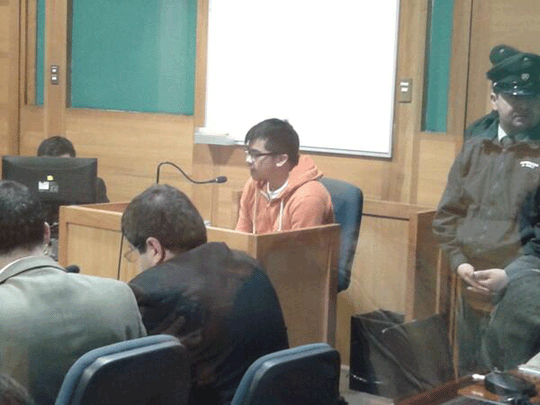



By Joel Keep
Published On: Mon, Feb 17th, 2014

Raul Castro gives evidence in Angol Criminal Court in August, 2013. Photo via Carlos A Martinez J / Twitter
Defense lawyers for two indigenous men say they are canvassing options for potential legal action against the Chilean state, after their clients were cleared of terrorism allegations as the testimony of a self-declared police informer was ruled unreliable last week.
The co-accused, Juan Queipul and Luis Marileo, were detained for two years under Chile’s controversial anti-terrorism legislation, according to Radio Universidad de Chile. Both were accused of involvement in a 2009 attack on a toll station on the Pan-American Highway near Quino, in which staff were assaulted and several nearby vehicles set alight.
Both were minors at the time of their arrest even though Chilean law explicitly prohibits the application of anti-terror legislation against those under the age of 18.
The defense team told Radio Universidad de Chile they would review the case carefully before taking action.
“We will evaluate the possibility of suing the state for a breach of the minimum guarantees of due process,” defense lawyer Sebastián Saavedra said.
Queipul and Marileo were charged alongside seven adults found not-guilty in July 2012 after the testimony of the prosecution’s star witness was deemed unreliable.
In a ruling last year, Marileo was sentenced to 10 years for his role in an unrelated robbery and homicide.
Following his acquittal, Queipul told El Dinamo he had been harassed by police from an early age before ultimately being held in preventive custody for several years.
“The government robbed me of my childhood,” he said.
During the course of last week’s trial, the court heard explosive allegations relating to the protected witness’ role as an alleged undercover agent for the police.
The witness, Raul Castro, who provided anonymous testimony under special anti-terrorism provisions, claimed he was an undercover agent tasked with infiltrating Mapuche activist groups in the the Araucanía Region.
Castro told the court that police intelligence officers recruited him as an informant while he was politically active within the Mapuche community as a student in Temuco in 2009.
He said he was offered leniency on criminal charges laid against him relating to the possession of marijuana and the misappropriation of war materiel during his military service, in exchange for collecting intelligence.
Araucanía Assistant Public Prosecutor Roberto Garrido has denied the existence of any working relationship between Castro and his institution, but “could not rule out” the possibility of him being a paid informant of the police.
“He receives no salary from the public prosecutor’s office or any monthly salary. [However,] he is under protection due to the severity of the threats made against him,” Garrido told local media.
Castro also claimed to have carried out four arson attacks with the permission of his handlers in the security forces.
Intelligence and testimony from Castro has since been used in the trial of more than 30 Mapuche activists accused of various crimes under the anti-terrorism law. All were acquitted by judges who considered Castro not be a credible witness.
Following last week’s revelations, Dep. Osvaldo Andrade, president of the Socialist Party (PS), demanded further explanation of Castro’s relationship with police.
“I call for this to be investigated and clarified because [the allegations leveled] are extremely serious and threaten to call into question the actions of both the public prosecutor and the Araucanía police force,” he said last week.
Víctor Queipul, lonko of the Temucuicui Autonomous Mapuche Community where some of the accused in the Quino case live, told media that such false flag operations by security forces were part of a concerted effort by the Interior Ministry to justify the application of the anti-terrorism law south of the Río Bío Bío.
Queipul, head of the Temucuicui community, called upon authorities to publicly clarify the extent of police infiltration in Mapuche affairs.
“These are government institutions and someone has to answer for this. We have asked the Interior Ministry to clarify their position, but we have heard nothing,” Queipul said. “Nor have the police made their position clear.”
Source: The Santiago Times